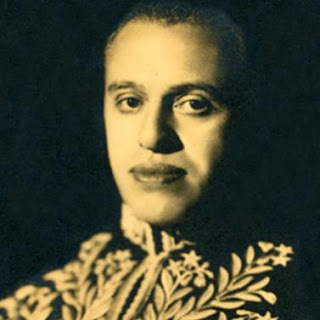Biography.
Cassiano Ricardo (July 26, 1895 – January 14, 1974) was a Brazilian journalist, literary critic, and poet. An exponent of the nationalistic tendencies of Brazilian modernism, he was associated with the Green-Yellow and Anta groups of the movement before launching the Flag group, a social-democratic reaction to these groups. His work evolved into concrete poetry at the end of his career.
M´Orpheus
I
Dream, the only god Who inhabitsour house — the unique memory
that we have had wings —
and who still corrects
— while we are apparently dead —
what there is of malediction in our body.
Under the aesthesia of sleep, while
we are horizontal,
as on a nocturnal
operations table.
He shapes, with the chisel of a feather, the statue
that is sleeping.
So that we can still see, not only
life, which is the real thing
(the night is a cemetery of words)
but also something beyond us,
and in spite of us.
II
And because dream is the image of poetryand sleep is the brotherly being of death,
Orpheus is separated from Morpheus only
by a secret M.
By an M that only the dead man knows
after he has understood nothing.
(Because it is labial, and grave.)
The Four Angels
They are not more than four.But they surround me, and inform me
of the harshest truth to be heard.
And they make me bow my head.
Ah, the angels who jump over the wall,
who smoke behind God´s back, who utter
obscene things, those are not
the ones who disappoint me, the angel who wept three times
before speaking, that is the one.
The angel of shining feet, who will blow again the trumpet
of Jericho, that is not the one.
These are the four angels who, perhaps accidentally,
made me cry.
And who play around me, while I weep blood,
and while the snow falls.
Just now these four angels have told me
a terrible word.
The Hidden Rose
Against the demon of lucidity the birds sing.What I seek is not in any photograph.
It is before me, hidden from myself and the Night.
The river from which I have drunk my tears is not
on any map.
I must be on the earth for the contemplation of stars>
Ah, misfortunate
he who lives on the earth without seeing the stars,
he who has feet to lead his body,
full of deaf and absurd demands,
but has no hands to go pluck a rose.
Translated by John Nist



